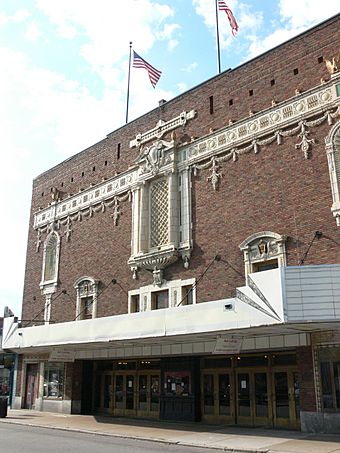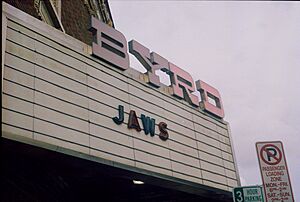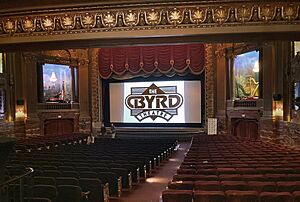Byrd Theatre facts for kids
|
Byrd Theatre
|
|
 |
|
| Location | 2908 W. Cary St., Richmond, Virginia |
|---|---|
| Area | less than one acre |
| Built | 1928 |
| Architect | Fred Bishop |
| Architectural style | French Empire Period |
| NRHP reference No. | 79003289 |
Quick facts for kids Significant dates |
|
| Added to NRHP | September 24, 1979 |
The Byrd Theatre is a famous movie theater in the Carytown area of Richmond, Virginia. It was named after William Byrd II, who helped found the city. The theater first opened on December 24, 1928, and people loved it! It's often called "Richmond’s Movie Palace" because it's so grand. Even though it has a huge Wurlitzer pipe organ, it was also one of the first theaters built to show movies with sound.
Contents
History of the Byrd Theatre
The Byrd Theatre was built in 1928. It cost about $900,000 back then, which would be over $12 million today! Charles Somma and Walter Coulter were the builders.
Opening Day and Early Years
The theater opened its doors on December 24, 1928. At that time, an adult ticket for an evening show was 50 cents. A matinee (daytime) show was 25 cents. Kids could get in for just 10 cents! The very first movie shown was Waterfront. It starred Dorothy Mackaill and Jack Mulhall. Robert Coulter was the manager for a very long time, until 1971.
Changes Over Time
In the past, the Byrd Theatre did not allow African-American people to attend until the 1960s. This was a common practice called segregation at the time. In 1953, the theater updated its movie projectors.
As of 2025, the Byrd Theatre usually shows movies that have already been released in other theaters. Tickets cost $8.00. It also hosts special events like the Richmond French Film Festival, which used to happen every March. However, this festival stopped in 2024. The theater also used to show classic movies late on Saturday nights, but this stopped in 2007. On March 15, 2024, actor William Shatner visited the Byrd Theatre. He hosted the first showing of his documentary, William Shatner: You Can Call Me Bill, there.
Amazing Architecture and Design
Fred Bishop was the architect and builder of the Byrd Theatre. Its design is called French Empire style. Inside, the main floor has 916 seats for the audience. The balcony has 476 seats. The balcony is opened when many people come to a show.
Inside the Byrd Theatre
The inside of the theater is very fancy. It was designed by Arthur Brunet Studios from New York. There are eleven beautiful chandeliers made of crystal from Czechoslovakia. One huge chandelier hangs over the main seating area. It is 18 feet tall and weighs two and a half tons! It has over 5,000 crystals and is lit by 500 colorful lights. The theater also has marble from Italy and Turkey. You can see hand-sewn velvet drapes and paintings of Greek myths. The building even had a special vacuum system and a natural spring in the basement. This spring used to help cool the building!
Sound and Music Systems
The Byrd Theatre was built when movies were changing from silent films to "talkies" (movies with sound). So, the designers put in two different sound systems. One was called Vitaphone, which used records to play sound with the movie. This system was used for "The Jazz Singer," which was one of the first talking films. The other sound system was from Western Electric. Because no one was sure if talking movies would last, the Byrd also included a large Wurlitzer Theatre organ.
The Wurlitzer Organ
The Byrd Theatre's Wurlitzer organ is very special. Its pipes are in four rooms above the stage. In the basement, there's a vacuum blower for the piano and an elevator. This elevator lifts the organ's keyboard (called the console) up to the stage for performances. The organ uses electricity and air to make different sounds. All the pipes, bells, drums, and other effects are real, not electronic. To change how loud the sound is, large slats called swell shades open and close. A tone chute carries the sound from the fourth floor down to the audience.
The theater also has other instruments that can be played from the organ console. There's a marimba and a 37-note xylophone. There's also a Wurlitzer grand piano that can be played from the organ or its own keyboard. A Lyon and Healy harp is there too, but it's just for decoration. Many talented organists have played at the Byrd. Today, Bob Gulledge plays the Wurlitzer on Saturday nights.
Saving the Byrd Theatre
Because it has been around for so long, the Byrd Theatre was named a Virginia Historic Landmark in 1978. Then, in 1979, it was added to the National Register of Historic Places. This means it's a very important historical building. In 2007, a group called the Byrd Theatre Foundation was formed. This non-profit group bought the theater to help fix it up and keep it going.
Restoration Efforts
From 2007 to 2014, the Foundation raised over $1 million. They used this money to replace the roof and fix the heating and cooling systems. They also bought new digital projectors. In 2017, they removed some seats on the main floor and put in 236 new ones. These new seats are farther apart, giving people more legroom. Some of the original seat frames are still there. Most of the original fabric on the upstairs seats is still in place. In 2006, a new Dolby Digital sound system was installed. The person who created the system, Ray Dolby, even donated it himself after visiting the theater!
In 2010, someone stole a donation box from the theater. Even though they probably only got less than $100, they caused about $1,200 worth of damage to the doors. But after the news reported it, people in Richmond donated money to help the theater.
 | Emma Amos |
 | Edward Mitchell Bannister |
 | Larry D. Alexander |
 | Ernie Barnes |





